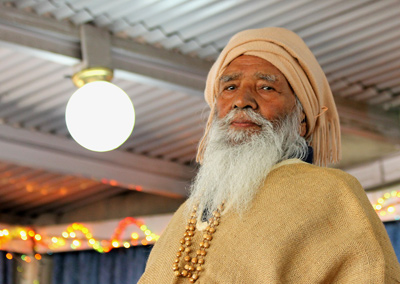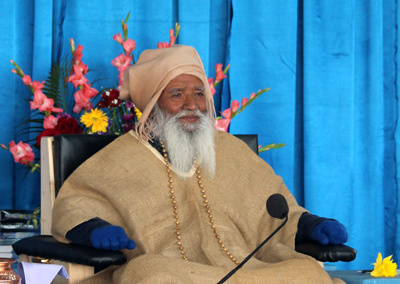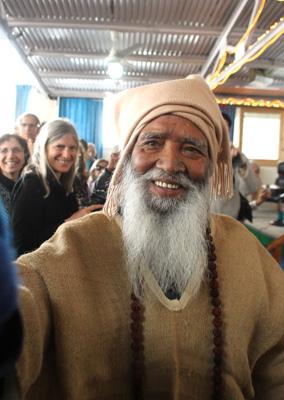Nameless, Formless, World-less
and Brahm-less

Here is a very nice point for everyone. The word “freedom” does not fall in the category of human consciousness, and human consciousness does not fall in the category of freedom. What happens to freedom when a child is born and, thus, consciousness comes? The very child who is born is consciousness. This consciousness came from where? From freedom. Suppose freedom has expressed consciousness. Then why should consciousness not be freedom? Yet the moment a child is born, he is opposite to freedom. So consciousness is opposite to freedom.
A human being is born, so he cannot—with consciousness—reach freedom, the unborn. But there is somebody who is neither freedom nor consciousness, the name of which is Gyan (Knowledge), or Guru, which many of us conceive of as God. Words create a problem. Suppose someone says, “The Self and the world.” Hearing this, it sounds like the world is not the Self and the Self is not the world. The one who is neither the Self nor the world is Guru—and he knows that the Self and the world are nothing but Guru.
As long as you are a human being, you will hope that you should grow in the state where you do not remain death-ridden. If you do not want to remain death-ridden, then you should not remain birth-ridden. A human being is born, and as soon as he is born, he is consciousness. You call consciousness the ego-intellect-mind and senses. How should you know what I am saying? If I keep speaking one-sidedly, you will not know, because you are always name-and-form consciousness. In the waking state, you are consciousness, and in deep sleep, you are unconsciousness. How does unconsciousness become waking-state consciousness and dream-state consciousness? When the dream state is not, you are again deep sleep. And if deep sleep and the dream state are not, then you are the waking state. These three states of consciousness are explained by a child who is born. And you need freedom.
Freedom is neither the unborn Self nor the born world. So “Self and not-Self” and “not-Self and Self” is the language of a human being. He thinks, “I need freedom.” When he is dead, then he is freedom; and when he is not born, then he is freedom—but then freedom is not experienced by him. There is only the confusion of deep sleep, the dream and the waking state. Thus, in scriptures they have begun to speak about turiya (the fourth state). If turiya is there, then the three states are not; and if the three states are there, then turiya is not. But if you can say you are in turiya, then again freedom has not come—because you are still a body who is jeevanmukt (free while alive), or a person who is Self-realized. When being Self-realized also is not [laughter]—then both are not: the Self is not and the not-Self is not. Whatever remains, that is being spoken about by Guru.
But you cannot get it. It is for you to grasp this: you are neither born nor unborn. I began to say to people, “You have the power to know that seventy-two years before, you were not born.” From where did this power come? This power knows both born and not born. But this power is not enough. This power should also be transformed into neither born nor unborn. Whatever remains… Now, a human being cannot reach that. …
As long as the human situation is there, we can talk about the human situation, because you think just the same way, and I will think just the same way. Suppose I reached that which is neither human nor inhuman, neither a scientist nor a spiritualist. If both are gone, then what remains? Unless you reach that I, until then you will remain this I. If you reach that I, then this I is gone—which a human being does not now want to leave. He wants to live with this I as a human being, and he does not want to die. So he has rag and dwaysh, or love and aversion: aversion for death and love for life. But both are death. For neither life is actually life nor death is actually death, yet neither death is called life nor life is called death. So there is this illusion. As long as this illusion remains, freedom will never come.
.......
 Someday, the light of Guru will appear. Then you will say, “Yes, the light of Guru alone is.” Then “this” is cancelled: the eyes will see this, but it is cancelled. Yet it is held, because the eyes see it. Seeing and cancelling at the same time—this a human being cannot know. He either wants cancellation or something which is seen. …
Someday, the light of Guru will appear. Then you will say, “Yes, the light of Guru alone is.” Then “this” is cancelled: the eyes will see this, but it is cancelled. Yet it is held, because the eyes see it. Seeing and cancelling at the same time—this a human being cannot know. He either wants cancellation or something which is seen. …
Both unborn and born are not. Whatever remains, that is the truth. The word “truth” cannot be spoken, because if you say “That is the truth,” truth is a word, and then untruth is also a word. That is why a human being has to remain a human being throughout his life, until he dies. If a human being is forever, why does he die? If he dies—death means it should be forever—then why does he take birth again? We have come to know that in knowledge, the world is dissolved. If the world is dissolved, then your body is also dissolved. Then, what remains? In scriptures, they began to call it Brahm (the Whole, the Absolute), which is a word. The moment a word is used, then Brahm is gone. Many people say “Aham Brahm (I am the Absolute).” For them, Aham is here, and then they want to say that is Brahm. They say, “Thou art That.” When both “Thou art That” and “That Thou art” are not, then it is the truth.
As long as we are listeners to the scriptures, we cannot go anywhere, we will be the scriptures. A child is born without scriptures. We give the example that a child is born, and you think the child is Stephen [the person who was making the inquiry]. Now, when you say “Stephen,” the child is lost; and when you say “the child,” then Stephen is lost. Then, who is there for whom both are not? That is called Guru.
As long as you are a human being, we try to reach there, to reach there, to reach there. In many incarnations, you have been trying to reach there, to reach there—but you do not leave this, because each time you have to take birth. It is actually a serious matter, but we laugh about it. Hearing us laugh, a human being will be confused and wonder why we are laughing. For laughing is neither Brahm nor not-Brahm. In that state, it is Guru who remains. Guru is neither Brahm nor aham. With scriptures, we either have to say Brahm or we have to say not-Brahm. Both are a difficulty. That is why there must be something for you. Some technique should be there. Because you are all That—free! But why do you not feel free? And why do you also feel free? What a ticklish problem it is [laughter] that you feel free and you do not feel free. Yet we have to continue as human beings. …
The human brain is so complicated that in it the world is, but when it is all alone, then the world is not. It is the same brain, the same waking state of a human being, in which sleep is and dream is, and sleep is not and dream is not. The brain is that way. When we continue to have a dialogue, when we continue using words, someday something opens. We say “opens,” but again a problem comes of “open” and “not open.” Both are not—open and not open. That is the Truth.
Stephen said, “Guru is the only door, or way.” Guru has to be there. If Guru is not there, then there is no possibility. When Guru speaks, then all become Guru. At that time, it is not that you are not Guru. When Guru is quiet, then all of you are again human beings. It is just like that. Then, what to do now? We want our children to be free. The elders are very sincere that they want them to be free. But how can they be free when they have been carrying on with the senses? The senses are the preventive power. When the preventive power is to be smashed, then they speak of Brahm. Hearing this, a human being is happy and says, “Oh, I came to know Brahm.” But when he came to know Brahm, he is still not free.
 You have accepted the microcosm and the macrocosm. This will continue with a human being. When a human being dies, he cannot say macrocosm and microcosm. But you do not want to take death. Because if a human being takes death, then he leaves everything: he is not a human being, he is not a mind, he does not have eyes, he does not have ears, he does not have relations, he does not have friends, he does not have anything. Then, what do we do? We should remain human beings and continue waiting for death. [Laughter] Or you can die, and live freedom while alive.
You have accepted the microcosm and the macrocosm. This will continue with a human being. When a human being dies, he cannot say macrocosm and microcosm. But you do not want to take death. Because if a human being takes death, then he leaves everything: he is not a human being, he is not a mind, he does not have eyes, he does not have ears, he does not have relations, he does not have friends, he does not have anything. Then, what do we do? We should remain human beings and continue waiting for death. [Laughter] Or you can die, and live freedom while alive.
As soon as you are born, it is very obvious that you must have died, so you are born. Then what is being born? Death. Being born is an expression of death, and death is an expression of being born. When you have gotten it, now you are quiet. Then what will you say? He [Dr. Stephen] passed it on, saying, “Only Guru can know.” To say “Through Guru you will know” is to maintain your individuality, for you have passed it on to Guru. And Guru is so dumb that he says, “Ok.” [Laughter] He takes it to be “Now, next time, he will take a turn.”
All scriptures are complicated. All human beings are complicated—they are confused. When confusion is gone, you feel easy. This means that the waking state is not and the dream state is not: sleep is there. But nobody knows that in sleep, the waking and dream states have gone inside sleep. The whole tree has gone into the seed. The one who knows the seed knows the tree as a whole—that the seed alone is. Once you know that the Self alone is, that Brahm alone is, then the world is not. And when you know world is a word and Brahm is a word, then the two words are separate from each other in meaning. As long as a human being is making meaning, it is because of his consciousness, and consciousness is illusory. The illusion has made the world of imagination and calls it real. Guru knows this and says, “Let him say it is real and not real, and continue struggling.” But how long can you struggle? In any one of your incarnations, you have to come to realize.
That, Guru says, is free. When you do not know free, then he says it is pure. When you say pure is not, then he says it is forever. When you say, “Forever, I do not understand,” then he says it is ever present. So words are being used in this way, that way, this way. When both contradictions take place, then neither words are there nor no words are there. A human being feels happy when he thinks, “Let me not use words, let me be maun (silent).” But he cannot be maun. Maun is also full of words, and words will come out of that. That is why we take time. …
If Guru is not, then the world is the world. If Guru appears, then Shyam appears. Then John asks, “What word should I use to replace the word ‘Shyam?’” You have to do this, because in your country there is no word “Shyam,” but people there cannot deny there is “pure.” Pure is a word that is everywhere, in every language. We have to speak in such a way that the language we use belongs to our own country’s language, our own people’s language and own mental language. You can speak about this to anybody if you see in him the possibility that he can be nameless, formless, world-less and Brahm-less. When both are less, then whatever remains… Whatever remains after everything has been dissolved, the one who knows this, he is Gyan.
That is why, when everything is sorted out, it ends in Gyan, in knowledge. Gyan, Guru and God, these three are all one reality. Call it God, it is Gyan. Call it Gyan, it is God. Call it Guru, it is God. Call it Gyan, it is Guru. Call it God, it is Guru. They are three words, but it is that which remains. When words do not get spoken, then what remains? This. [He waves his hand, indicating the dimension now being experienced.] Then I say that everybody is Self-realized, which means that you are born Self-realized—and born means that you are unborn. [He laughs]. This goes on. In this way, you come to know something. …
A human being knows Gyan, but he immediately makes Gyan into agyan, or the names of things and forms. That is the human situation. That is to be studied. If you study the human situation, you find that the human situation was never born. Then there is no name and no form for it. Through the human situation, you have come to know words. So we have tried to reach. Whoever has reached, he might say something. …Copyright © 1999-2015 International
Meditation Institute. All Rights Reserved